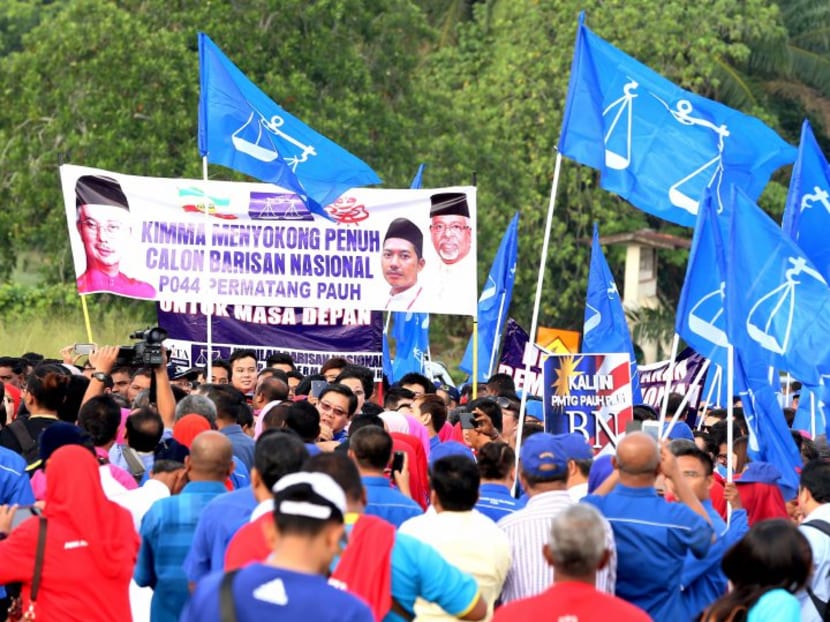Malaysia goes to the polls on May 9
KUALA LUMPUR — After months of speculation, Malaysia will officially go to the polls on May 9 for its 14th general election. The writ of election will be issued on Wednesday, and nomination day will fall on April 28. Early voting would start on May 5, according to the commission.
KUALA LUMPUR — After months of speculation, Malaysia will officially go to the polls on May 9, which falls on a Wednesday, for its 14th general election.
The Election Commission (EC) announced the date after a special meeting on Tuesday (April 10) to discuss key dates as well as preparations for the national polls.
The writ of election will be issued on Wednesday (April 11), and nomination day will fall on April 28, meaning an 11-day campaign period. Early voting would start on May 5, according to the commission.
"The EC has held a meeting and established that polls must be held within 60 days of the date of (Parliament's) dissolution," the commission's chairman, Mohd Hashim Abdullah, told a news conference.
Hours after the announcement, Malaysia's education ministry declared May 9 as a special school holiday, with all 10,180 public schools nationwide to be closed on that day. This is because nearly 7,000 schools are used as polling centres.
Prime Minister Najib Razak set the stage for the polls last Friday when he announced the dissolution of parliament. An estimated 14.9 million voters are eligible to vote in the upcoming election, which is set to be one of the toughest for the ruling Barisan Nasional (BN) coalition in decades.
Observers however believe that having an election during a weekday could benefit BN due to a lower voter turnout.
A sizeable number of Malaysian voters work and live abroad in countries such as Singapore, Hong Kong and Australia and holding the polls in the middle of the week would make it difficult for them to return home to cast their votes.
"The lower the voter turnout, particularly in the urban areas, the more it would adversely impact (opposition pact) Pakatan Harapan," Dr Mustafa Izzuddin, a fellow at the Iseas-Yusof Ishak Institute, told TODAY.
"Holding an election on a weekday is a calculated strategy in itself by the incumbent BN as it could reduce the voter turnout in urbanised constituencies, undercutting the support for Pakatan Harapan as a result."
The move is also another strategy by Mr Najib to give BN as much advantage as possible, noted Mr Rashaad Ali, a research analyst at the S Rajaratnam School of International Studies' (RSIS) Malaysia Programme.
"This is because a worse result than GE13 in this election may leave him vulnerable to internal pressure within Umno," he said.
Unsurprisingly, the midweek polling date has been criticised by both Malaysians and Opposition politicians.
"The choice of 9 May as polling day is another attempt by Najib and Umno to steal the election. It falls on a Wednesday, which is a working day. Those who work or live far from their polling centres may find it difficult to vote," said opposition Parti Pribumi Bersatu Malaysia (PPBM) member Wan Saiful Wan Jan, in using the acronym for ruling United Malays National Organisation.
"Umno wants a low turnout because they know a high number of voters are not with them. If turnout is high, the chances of Najib being forced out of Putrajaya is also high. Now it is extremely important for PH to make sure turnout does not drop. Do not let Najib steal GE14."
Malaysia’s first two elections in 1955 and 1959 were both on a Wednesday and as recent as 1995 and 1999, polls were held on a Monday. It was only in recent years that elections were held on a weekend.
In 2008, the election took place on a Saturday and saw a voter turnout of 75.99 per cent. This was followed by a record voter turnout of almost 85 per cent in 2013, when polling was on a Sunday. In 2008, BN lost its two thirds parliamentary majority and five years later, it lost the popular vote but managed to retain power as it won 133 out of 222 parliamentary seats.
Mr Najib and his coalition face an unprecedented challenge from his former mentor and former prime minister, Mahathir Mohamad who has joined hands with old foes in the federal Pakatan Harapan opposition pact and is their candidate for premier.
Dr Mahathir, 92, turned on Mr Najib after news broke of billions of dollars allegedly misappropriated from state fund 1Malaysia Development Berhad (1MDB), including US$681 million (S$894 million) in funds that found their way into the prime minister’s personal accounts.
Mr Najib has denied any wrongdoing and local authorities have cleared him.
Though the upcoming polls will take place amid a period of robust growth for Malaysia, Mr Najib and BN are grappling with public anger over rising living costs. Some observers have suggested the possibility of a "Malay tsunami" against BN, but Mr Najib has dismissed the notion. AGENCIES










